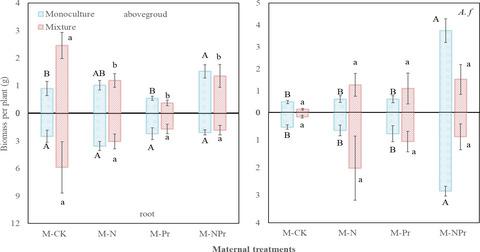当前位置:
X-MOL 学术
›
Ecol. Evol.
›
论文详情
Our official English website, www.x-mol.net, welcomes your
feedback! (Note: you will need to create a separate account there.)
Transgenerational effect alters the interspecific competition between two dominant species in a temperate steppe
Ecology and Evolution ( IF 2.3 ) Pub Date : 2021-01-10 , DOI: 10.1002/ece3.7066 Yang Li 1, 2 , Longyu Hou 3 , Liuyi Yang 3 , Ming Yue 1, 2, 4
Ecology and Evolution ( IF 2.3 ) Pub Date : 2021-01-10 , DOI: 10.1002/ece3.7066 Yang Li 1, 2 , Longyu Hou 3 , Liuyi Yang 3 , Ming Yue 1, 2, 4
Affiliation

|
One of the key aims of global change studies is to predict more accurately how plant community composition responds to future environmental changes. Although interspecific relationship is one of the most important forces structuring plant communities, it remains a challenge to integrate long‐term consequences at the plant community level. As an increasing number of studies have shown that maternal environment affects offspring phenotypic plasticity as a response to global environment change through transgenerational effects, we speculated that the transgenerational effect would influence offspring competitive relationships. We conducted a 10‐year field experiment and a greenhouse experiment in a temperate grassland in an Inner Mongolian grassland to examine the effects of maternal and immediate nitrogen addition (N) and increased precipitation (Pr) on offspring growth and the interspecific relationship between the two dominant species, Stipa krylovii and Artemisia frigida. According to our results, Stipa kryloii suppressed A. frigida growth and population development when they grew in mixture, although immediate N and Pr stimulated S. kryloii and A. frigida growth simultaneously. Maternal N and Pr declined S. krylovii dominance and decreased A. frigida competitive suppression to some extent. The transgenerational effect should further facilitate the coexistence of the two species under scenarios of increased nitrogen input and precipitation. If we predicted these species' interspecific relationships based only on immediate environmental effects, we would overestimate S. krylovii's competitive advantage and population development, and underestimate competitive outcome and population development of A. frigida. In conclusion, our results demonstrated that the transgenerational effect of maternal environment on offspring interspecific competition must be considered when evaluating population dynamics and community composition under the global change scenario.
中文翻译:

跨代效应改变了温带草原两个优势物种之间的种间竞争
全球变化研究的主要目标之一是更准确地预测植物群落组成如何响应未来的环境变化。尽管种间关系是构建植物群落的最重要力量之一,但在植物群落层面整合长期影响仍然是一个挑战。随着越来越多的研究表明,母体环境通过跨代效应影响后代的表型可塑性,作为对全球环境变化的反应,我们推测跨代效应会影响后代的竞争关系。我们在内蒙古草原温带草原进行了为期10年的田间试验和温室试验,研究母体和即时氮添加(N)和增加降水量(Pr)对子代生长的影响以及两者之间的种间关系。优势种为克氏针茅和冷蒿。根据我们的结果,克氏针茅在混合生长时抑制了冷蒿的生长和种群发展,尽管直接施氮和镨同时刺激了克氏针茅和冷蒿的生长。母本N和Pr在一定程度上降低了克氏冷链霉菌的优势度并降低了冷链霉菌的竞争抑制。在氮输入和降水增加的情况下,跨代效应应进一步促进两个物种的共存。如果我们仅根据直接环境影响来预测这些物种的种间关系,我们就会高估S.krylovii 的竞争优势和种群发展,并低估了A. frigida的竞争结果和种群发展。总之,我们的结果表明,在评估全球变化情景下的种群动态和群落组成时,必须考虑母体环境对后代种间竞争的跨代影响。
更新日期:2021-02-05
中文翻译:

跨代效应改变了温带草原两个优势物种之间的种间竞争
全球变化研究的主要目标之一是更准确地预测植物群落组成如何响应未来的环境变化。尽管种间关系是构建植物群落的最重要力量之一,但在植物群落层面整合长期影响仍然是一个挑战。随着越来越多的研究表明,母体环境通过跨代效应影响后代的表型可塑性,作为对全球环境变化的反应,我们推测跨代效应会影响后代的竞争关系。我们在内蒙古草原温带草原进行了为期10年的田间试验和温室试验,研究母体和即时氮添加(N)和增加降水量(Pr)对子代生长的影响以及两者之间的种间关系。优势种为克氏针茅和冷蒿。根据我们的结果,克氏针茅在混合生长时抑制了冷蒿的生长和种群发展,尽管直接施氮和镨同时刺激了克氏针茅和冷蒿的生长。母本N和Pr在一定程度上降低了克氏冷链霉菌的优势度并降低了冷链霉菌的竞争抑制。在氮输入和降水增加的情况下,跨代效应应进一步促进两个物种的共存。如果我们仅根据直接环境影响来预测这些物种的种间关系,我们就会高估S.krylovii 的竞争优势和种群发展,并低估了A. frigida的竞争结果和种群发展。总之,我们的结果表明,在评估全球变化情景下的种群动态和群落组成时,必须考虑母体环境对后代种间竞争的跨代影响。











































 京公网安备 11010802027423号
京公网安备 11010802027423号